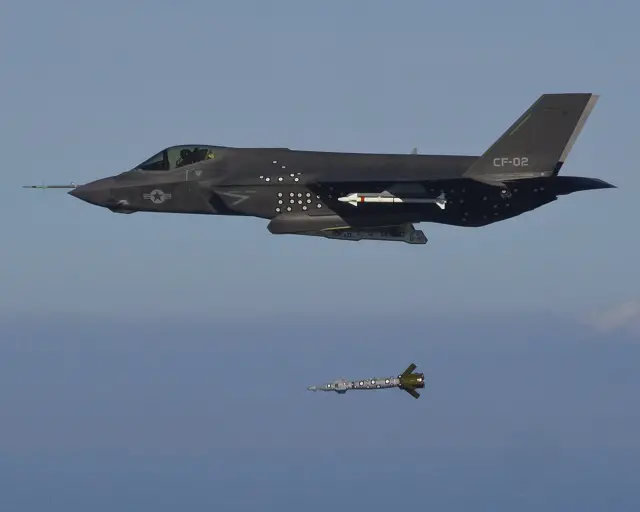Breaking news
US Navy F-35C Completes First Weapons Separation Test.
| 2013
| |
|||
| a | |||
Defense
Industry News - USA |
|||
| US Navy F-35C Completes First Weapons Separation Test | |||
The
Navy variant of the F-35 executed the first airborne separation test
of an inert weapon on 21 October. Marine Corps test pilot Capt Justin
Carlson flew the F-35C test aircraft known as CF-2 over an Atlantic
test range when he released the 500-pound inert Guided Bomb Unit-12
(GBU-12) Paveway II laser-guided weapon from an internal weapons bay.
With Monday's weapons separation, all three F-35 variants have released
ordnance from their weapons bays. |
|||
 ATLANTIC OCEAN (Oct. 22, 2013) The F-35C Lightning II Joint Strike Fighter, piloted by Marine Corps Capt. Justin Carlson, assigned to Naval Air Systems Command, Patuxent River, Md., performs the first F-35C weapon separation by releasing the 500-pound inert Guided Bomb Unit (GBU) 12 over an Atlantic test range. (U.S. Navy photo/Released) |
|||
The
F-35C carrier variant of the Joint Strike Fighter is distinct from the
F-35A and F-35B variants with its larger wing surfaces and reinforced
landing gear to withstand catapult launches and deck landing impacts
associated with the demanding aircraft carrier environment. Initial
carrier trials for the F-35C are scheduled for 2014. The F-35 Lightning II is a 5th generation fighter, combining advanced stealth with fighter speed and agility, fully fused sensor information, network-enabled operations and advanced sustainment. Three distinct variants of the F-35 will replace the A-10 and F-16 for the U.S. Air Force, the F/A-18 for the U.S. Navy, the F/A-18 and AV-8B Harrier for the U.S. Marine Corps, and a variety of fighters for at least 10 other countries. Link to F-35C technical datasheet |



















